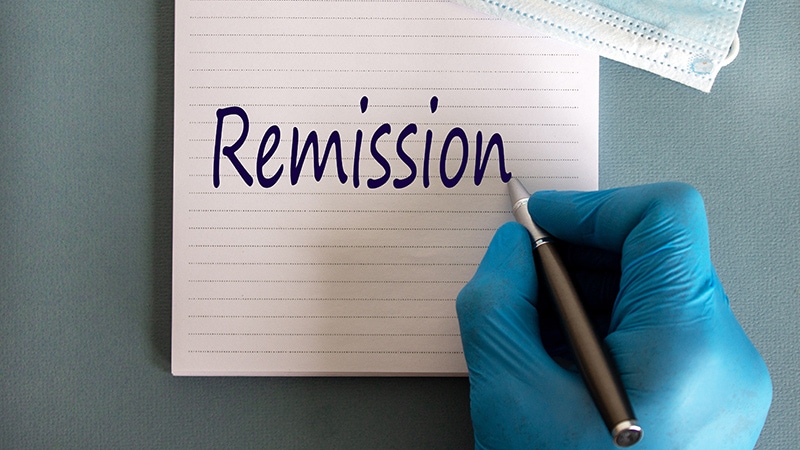
A new joint consensus statement by four major diabetes organizations aims to standardize the terminology, definition, and assessment to the phenomenon of diabetes "remission."
The statement was jointly issued by the American Diabetes Association, the Endocrine Society, the European Association for the Study of Diabetes, and Diabetes UK.
The 12-member international writing panel propose use of the term "remission", as opposed to others such as "reversal", "resolution", or "cure", to describe the phenomenon of prolonged normoglycemia without the use of glucose-lowering medication in a person previously diagnosed with type 2 diabetes.
"Diabetes remission may be occurring more often due to advances in treatment," said writing group member Amy Rothberg, MD, of the University of Michigan, Ann Arbor, in a statement.
The group define "remission" — whether attained via lifestyle, bariatric surgery, or other means — as an A1c < 6.5% (< 48 mmol/mol) at least 3 months after cessation of glucose-lowering pharmacotherapy. The panel also suggest monitoring individuals experiencing diabetes remission and raise questions that need further attention and study.
But it's not a guideline, panel chair Matthew C. Riddle, MD, told Medscape Medical News. Rather, "The main purpose of the statement was to provide definitions, terminology, cut-points, and timing recommendations to allow data collection that will eventually lead to clinical guidelines," he said.
A great deal of epidemiological research is conducted by analyzing data from medical records, he noted. "If clinicians are more consistent in entering data into the records and in doing measurements, it will be a better database."
Remission Reality: Advice Needed for Deprescribing, Talking to Patients
"Increasingly our treatments are getting glucose levels into the normal range, and in many cases, even after withdrawal of drug therapy. That's not an anomaly or a fiction, it's reality. Clinicians need to know how to talk to their patients about it," noted Riddle, of the Division of Endocrinology, Diabetes & Clinical Nutrition at Oregon Health & Science University, Portland.
There is a need for data on the effects of deprescribing once normoglycemia is achieved, he said. "It really goes a long way to have strong epidemiological and interventional evidence. That's what we need here, and that's what the group is really hoping for."
The statement recommends the following:
-
The term "remission" should be used to describe a sustained metabolic improvement in type 2 diabetes to near normal levels. The panel agreed the word strikes the best balance, given that insulin resistance and beta-cell dysfunction may still be present despite normoglycemia. "Diabetes doesn't get cured. The underlying abnormalities are still there. Remission is defined by glucose," Riddle said. The panel also decided to do away with ADA's former terms "partial", "complete", and "prolonged" remission because they are ambiguous and unhelpful.
-
Remission should be defined as a return to an A1c of < 6.5% (< 48 mmol/mol) — the threshold used to diagnose diabetes — spontaneously or following an intervention and that persists for at least 3 months in the absence of usual glucose-lowering medication.
-
When A1c may be unreliable, such as conditions involving variant hemoglobin or erythrocyte survival alterations, acceptable alternatives are a fasting blood glucose < 126 mg/dL (< 7.0 mmol/L) or an estimated A1c < 6.5% calculated from continuous glucose monitoring data.
-
A1c testing to document a remission should be performed just prior to an intervention and no sooner than 3 months after initiation of the intervention and withdrawal of any glucose-lowering medication.
-
Subsequent ongoing A1c testing should be done at least yearly thereafter, along with routine monitoring for diabetes-related complications, including retinal screening, renal function assessment, foot exams, and cardiovascular risk factor testing. "At present, there is no long-term evidence indicating that any of the usually recommended assessments for complications can safely be discontinued," the authors write.
-
Research based on the terminology and definitions in the present statement is needed to determine the frequency, duration, and effects on short- and long-term medical outcomes of type 2 diabetes remissions using available interventions.
Riddle told Medscape Medical News: "We thought that the clinical community needed to understand where this issue stands right now. The feasibility of a remission is greater than it used to be."
"We're going to see more patients who have what we can now call a remission according to a standardized definition. In the future, there are likely to be guidelines regarding the kind of patients and the kind of tactics appropriate for seeking a remission," he said.
The statement was simultaneously published online in each of the organizations' respective journals: Diabetes Care, Journal of Clinical Endocrinology & Metabolism, Diabetologia, and Diabetic Medicine.
Riddle has reported receiving research grant support through Oregon Health & Science University from Eli Lilly, Novo Nordisk, and AstraZeneca and honoraria for consulting from Adocia, Intercept, and Theracos.
Diabetes Care. Published online August 30, 2021. Abstract
Miriam E. Tucker is a freelance journalist based in the Washington, DC area. She is a regular contributor to Medscape, with other work appearing in the Washington Post, NPR's Shots blog, and Diabetes Forecast magazine. She is on Twitter @MiriamETucker.
For more diabetes and endocrinology news, follow us on Twitter and Facebook.
"type" - Google News
September 01, 2021 at 08:51PM
https://ift.tt/3jyS2Oj
Type 2 Diabetes 'Remission' Is a Reality, Say Major Organizations - Medscape
"type" - Google News
https://ift.tt/2WhN8Zg
https://ift.tt/2YrjQdq
Bagikan Berita Ini














0 Response to "Type 2 Diabetes 'Remission' Is a Reality, Say Major Organizations - Medscape"
Post a Comment